The Secret War on the Bosphorus
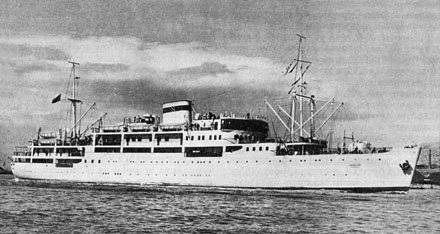 By the end of the 19th century, Istanbul became a Mecca for intelligence officers from all over the world. By June 1941, the Soviet embassy and trade mission in Ankara and the consulates in Istanbul and Kars were overcrowded with agents of the GRU and the NKVD, including doormen and drivers. The embassy was headed by Sergei Alexandrovich Vinogradov, in all encyclopedias he is called a professional diplomat. But at the very beginning of his biography there is a huge gap: he was born in 1907, and in 1939, he joined the People's Commissariat of Foreign Affairs (NCID), then in less than a year, on September 17, 1940 became ambassador to Turkey.
By the end of the 19th century, Istanbul became a Mecca for intelligence officers from all over the world. By June 1941, the Soviet embassy and trade mission in Ankara and the consulates in Istanbul and Kars were overcrowded with agents of the GRU and the NKVD, including doormen and drivers. The embassy was headed by Sergei Alexandrovich Vinogradov, in all encyclopedias he is called a professional diplomat. But at the very beginning of his biography there is a huge gap: he was born in 1907, and in 1939, he joined the People's Commissariat of Foreign Affairs (NCID), then in less than a year, on September 17, 1940 became ambassador to Turkey.With the beginning of the war, a stream of Soviet diplomats from both the GRU and the NKVD rushed into Istanbul. They traveled not only from Berlin and Rome, but also from Vichy (the USSR recognized the government of Marshal Petain) and other capitals controlled by the Reich. It was through Istanbul that they were exchanged for German, Italian, French and other diplomats.
Among them was an international journalist Nikolaev, returning from Berlin. Like several dozens of other “diplomats,” he was assigned to him by Vinogradov to remain in Istanbul as a press attache at the Soviet consulate in Istanbul. Later, the newly formed press officer will write:
“My task was the organization of intelligence against Germany. I had to work from Istanbul not only for cover purposes, although they were also important, but because it was a huge cosmopolitan center with Europeans of various nationalities and political views, many of whom were refugees of war. Among them it was natural to recruit people for our operations. These people made up the core of my illegal residents.
At the same time, I was looking for other homeless Europeans, Poles, Czechoslovakians, Yugoslavs, French, Italians, not only in Turkey, but also in the Middle East, people who want to return to their homelands and fight the Germans by joining underground organizations.
I was also assigned several special and urgent operations. One of them was cooperation with our military attache network in establishing and withdrawing maps of places suitable for caches, near Ankara, Istanbul, Izmir and other populated areas, as well as agricultural areas to the west of the Soviet border. These caches should have become future warehouses for a small-caliber automatic. weapons, communications equipment and money for the possible use of partisans. This was the standard method of action for the GRU in every country, but it has not yet been used in Turkey. ”
It is clear that all this was clearly beyond the power of the international journalist Nikolaev, but GRU officer Ismail Akhmedov zealously set to work.
In addition to the office buildings of the Soviet consulate in Istanbul, formerly owned by the embassy of the Russian Empire, the spies had at their disposal a huge floating hotel.
On the morning of June 22, the 1941 of the Dardanelles strait entered the largest Soviet passenger airliner Svaneti (displacement 5050 t, 244 of cabin places), serving the Odessa-Alexandria line.
Soviet historians prefer to keep silent about the future fate of the liner, only in highly specialized works it was said that the Turks allegedly detained him in Istanbul and did not release 1942 by the end of February. This is wild nonsense. The Turks could not detain the passenger liner in defiance of all international conventions, it would have been a "casus belli" for both the USSR and England. During the war, the Turks let our tankers, icebreakers and other vessels pass through the Straits.
According to the memoirs of the diplomat Berezhkov, “Svaneti” in Istanbul was used as a floating hotel for Soviet diplomats who left Germany, and in February 1942 the liner brought “the last group of diplomats” to Poti. And this version looks unconvincing. In fact, the last group of employees of the Soviet embassies and consulates was transferred to Kars in early August 1941 in the USSR, and the ambassador of Dekanozov and the diplomatic beau monde even got on the Istanbul-Ankara railway express train and then flew to Transcaucasia by plane.
In fact, "Svaneti" became in Istanbul a floating branch of the Lubyanka. In the very first days of their stay there, several dozen sailors were written off and sent to the Union from the ship. Needless to say, they quickly found a worthy replacement. Svaneti was the base for espionage and terrorist operations, and the headquarters was the Soviet consulate in Istanbul.
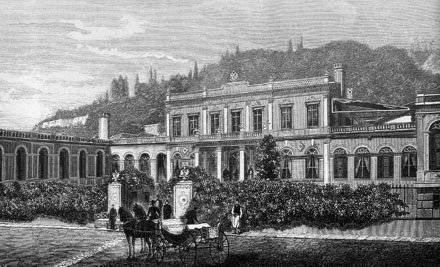 Istanbul. House of the Imperial Russian Embassy, which housed the Soviet consulate
Istanbul. House of the Imperial Russian Embassy, which housed the Soviet consulateIn the first weeks of the war, the command of the Black Sea fleet received intelligence from Moscow that large surface ships and large submarines of the Italian fleet proceeded through the Turkish Straits.
This information had disastrous consequences for the fate of the Black Sea Fleet and its main base, Sevastopol. The commander of the Black Sea Fleet, instead of interrupting the communications of the Germans on the Danube-Constanta-Istanbul line and assisting our Danube Flotilla, dispersed all surface ships and submarines for the defense of Soviet ports from Odessa to Batumi from the virtual Italian fleet. Moreover, the admiral ordered to mine all the approaches to our naval bases. Huge minefields of several thousand mines later played a fatal role in the defense of Sevastopol. They killed 12 Soviet combat and transport vessels and not a single enemy. The fact is that until the autumn of 1942, the Germans in the Black Sea did not even have small warships and submarines, and the Italian fleet existed only virtually on the maps of our admirals until the end of 1941.
When, at the end of October, 1941, troops of Colonel General Manstein broke through to the Perekopskiy Isthmus, half of the Soviet divisions stationed in the Crimea, took up positions on the coast of the peninsula in anticipation of the Italian-German amphibious assault.
How could such a Soviet intelligence be missed in Istanbul is incomprehensible to the mind. Indeed, from the windows of the Soviet consulate, the Bosphorus is perfectly visible, where even at night not only the destroyer, but also just the motorboat cannot slip unnoticed. Our ship stayed in Istanbul 2010 for five days in Istanbul, and even at night I saw all the vessels that passed well.
Submarines had to, according to the 1936 convention of the year, pass the Straits exclusively on the surface. Yes, and the hydrological conditions did not allow them to pass the Bosphorus in a submerged position - the strait is tortuous and narrow, and most importantly, there are two oppositely directed currents (upper and lower).
Who and where I looked on clear days and short nights of June-July 1941, I do not know. But the naval attache captain 1 of the rank of K. K. Rodionov, who rarely visited Ankara and spent most of his time in his Istanbul residence, received the Order of the Red Banner in 1942, and the following year - the rank of rear admiral and a bunch of orders, including Lenin and Nakhimov II degree.
I can’t rule out the possibility that the misinformation from Istanbul was the result of a big squabble between the GRU and NKVD residencies. Akhmedov wrote a lot about these squabbles and misinformation sent to Moscow.
A couple of months after the start of the war, a new press officer of the embassy arrives in Turkey, also an “international journalist” Leonid Naumov. Akhmedov wrote about him:
“The new chief resident of the NKVD, Leonid Naumov, has arrived, a fat and unpleasant man. He arrogantly replaced the lack of intelligence and boasted that he received instructions directly from Stalin and Beria. This type of morality was not too high. With him came a young blond girl from Moscow disguised as his secretary, but in reality she was his mistress. He had a vile word in store for everyone, even for Vinogradov, such as “instead of a hat for ceremonial occasions, this small person who calls himself an ambassador would rather wear a barrel on his head.” He could take any cover he wanted, but he decided, since we were almost openly hostile to each other, to become a press attaché. This circumstance put us in a fancy position, his in Ankara and me in Istanbul. As the main resident of the NKVD, he had an office in my city, also at the consulate. ”
I note that Comrade Naumov showed off his acquaintance with Beria and Stalin for a reason. His real name, Naum Eitingon, was not known by any of his fellow diplomats, nor from the police, nor from the NKVD.
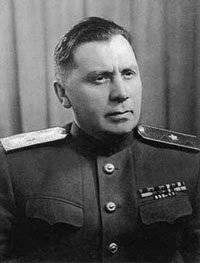 At 1929, Eitingon has already spent several months in Istanbul as a resident of the OGPU. But Eitingon was best known for his participation in special operations in 1936 – 1938. in the war in Spain. There, Eitingon acted under the pseudonym "General Leonid Kotov." I note that Naum liked the name Leonid, and to his comrades from Lubyanka he often presented himself as Leonid Eitingon. In Spain, Eitingon organized several terrorist attacks, as well as sending Spanish gold to the USSR. From Spain, Eitingon was often called to France to attend various events. So, in May, 1938 of the city of Eitingon escorted Pavel Sudoplatov to Le Havre and put him on board the Soviet steamer. As you know, 23 in May in Rotterdam Sudoplatov presented the leader of the Ukrainian nationalists Yevgeny Konovalets with a box of chocolates. The box exploded in the hands of Konovalets - a tricky mine was made by the famous explosive technician of the NKVD, Alexander Erastovich Timashkov.
At 1929, Eitingon has already spent several months in Istanbul as a resident of the OGPU. But Eitingon was best known for his participation in special operations in 1936 – 1938. in the war in Spain. There, Eitingon acted under the pseudonym "General Leonid Kotov." I note that Naum liked the name Leonid, and to his comrades from Lubyanka he often presented himself as Leonid Eitingon. In Spain, Eitingon organized several terrorist attacks, as well as sending Spanish gold to the USSR. From Spain, Eitingon was often called to France to attend various events. So, in May, 1938 of the city of Eitingon escorted Pavel Sudoplatov to Le Havre and put him on board the Soviet steamer. As you know, 23 in May in Rotterdam Sudoplatov presented the leader of the Ukrainian nationalists Yevgeny Konovalets with a box of chocolates. The box exploded in the hands of Konovalets - a tricky mine was made by the famous explosive technician of the NKVD, Alexander Erastovich Timashkov.After Spain, Eitingon led the leadership of Operation Duck — the liquidation of Trotsky. It was he who picked up the direct perpetrator Ramon Mercader, who killed Lev Davydovich with an ice pick in a villa in Mexico City.
Well, Eitingon, by secret decree of the Presidium of the Supreme Soviet of the USSR from 17 June 1941, was awarded the Order of Lenin for Operation Duck.
And now the "master of terror" arrived on the shores of the Bosphorus. Slowly his retinue began to gather. Alexander Erastovich Timashkov, a specialist in boxes of chocolates, arrived under the guise of a small embassy employee. Together with him appeared some kind of Frenchwoman - Mademoiselle Lucy - “an athlete, a Komsomol member and simply a beauty”. The blonde blonde was 28 years old, but she was not born in France, but in Ufa and her name was Muse Vyakhireva. In 1920, Muse and her mother moved to Moscow. In 18 years, Muza marries Gregory Malinovsky, changes his last name and in 1932 gives birth to his son Stanislav.
Malinovsky was a parachutist, a glider pilot and a parachutist girl mentor. Muse, too, begins to jump with a parachute. 17 June 1935 of the Muse and five more girls from the ANT-7 aircraft jumped from a height of 7035 m without an oxygen device. It was a world record, not surpassed until now. In addition to the usual jumps, Muza specializes in skydiving with a splash on Lake Senezhsky.
Muse perfectly drives a motorcycle, a lorry, pilots various types of gliders and a U-2 aircraft. She becomes a great shooter and is constantly improving her French, which she has known since childhood.
According to family legends, Muse was in the service of the NKVD in the early days of the war in the direction of the Central Committee of the Komsomol. But I very much doubt that before the war, a Komsomol member with a similar range of hobbies was outside the scope of this office.
One way or another, at the beginning of July 1941, the Muse, was part of a special unit under the People's Commissar of Internal Affairs under the command of Pavel Sudoplatov. His deputy was Naum Eitingon.
Already from the Eitingon group it is clear that a major terrorist attack is being prepared. There is a leader, he is a journalist, explosive engineer and performer in the form of a charming secretary Lucy. And who is the victim?
At the end of the summer of 1941, our entire espionage and diplomatic team was thrown in preparation for the assassination attempt on the German ambassador to Turkey. Generally speaking, it was not customary to kill ambassadors, even during the war, but there was a special case. The German ambassador, Franz von Papen, belonged to an ancient aristocratic family, whose origins are lost over the centuries. In any case, at the end of the 15th century, his ancestor, Wilhelm von Papen, owned large estates.
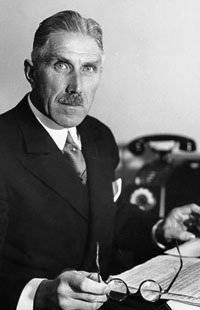 In the autumn of 1913, the 34-year-old officer of the General Staff, von Papen, was appointed military attache in the United States by the order of the Kaiser. In 1915, he was expelled from America for espionage. Then he was appointed adviser to the Turkish army 4 th and only in September 1918, he returned to Germany. After World War I, Papen became a close friend of Captain Canaris, the future admiral and leader of the Abwehr. 1 June 1932 President Hindenburg appoints von Papen as chancellor. Then Hitler becomes Reich Chancellor, and von Papen travels as ambassador to Austria. He played not the last violin in Hitler's coming to power and in the Anschluss (the peaceful accession of Austria to Germany).
In the autumn of 1913, the 34-year-old officer of the General Staff, von Papen, was appointed military attache in the United States by the order of the Kaiser. In 1915, he was expelled from America for espionage. Then he was appointed adviser to the Turkish army 4 th and only in September 1918, he returned to Germany. After World War I, Papen became a close friend of Captain Canaris, the future admiral and leader of the Abwehr. 1 June 1932 President Hindenburg appoints von Papen as chancellor. Then Hitler becomes Reich Chancellor, and von Papen travels as ambassador to Austria. He played not the last violin in Hitler's coming to power and in the Anschluss (the peaceful accession of Austria to Germany).In April, 1939. Hitler appoints von Papen as ambassador to Turkey. With the beginning of the Second World War, the new ambassador, at the direction of the Fuhrer, establishes contacts with British and American diplomats. The purpose of these contacts is to conclude a separate peace.
About Hitler's desire to capture the whole world we were told from school. And indeed, the stormtroopers shouted: “Today we own Germany, and tomorrow the whole world!” But who knows what was humming? Won "We will destroy the whole world of violence to the ground" began to sing in France, when Volodya Ulyanov regularly taught Latin at the gymnasium. But Hitler actually immediately after the end of the Polish campaign was looking for ways to peace.
British analysts already in 1939 – 1941. perfectly understood that in the event of the complete defeat of Germany, the USSR would dominate Europe. The only alternative to this is a separate peace. But Hitler is too odious a figure as a negotiating partner. And then the former vice-chancellor is at hand (the second person in the state, his own among the Abwehr, the diplomatic corps and the Wehrmacht generals in opposition to the Fuhrer).
As a result, Papen had to play a triple game in Ankara - the German ambassador, Hitler's secret envoy and a representative of the opposition. The main partners in the game were the American and British ambassadors and the nuncio of the Vatican. I would note that Pope Pius XII, like the Führer, sent not just a priest to Turkey, but a talented diplomat and “apparatchik” Giuseppe Roncali. After the war, Roncali will replace Pius XII and become Pope John XXIII.
Throughout the war, the Vatican played a key role in separate negotiations. Once at a meeting with Stalin, Churchill mentioned the number of divisions in England and the United States. Stalin very seriously asked: "And how many divisions does the Vatican have?", Hinting at the exorbitant political influence and ambitions of the "throne of St. Peter."
And in Moscow they decided to remove the potential chapter of the Third Reich.
Initially, the attempt on von Papen was scheduled to take place in the theater. He was to be shot by Mademoiselle Lucy. However, the journalist Naumov fell in love with the Muse and, apparently, therefore, failed the operation. In the end, they decided to use the 26-year-old Bulgarian as a terrorist, whose name is still hiding. It is only known that he studied at the University of Istanbul under the name of the Macedonian Omer.
According to the Soviet version, the Bulgarian perfectly shot from a pistol that the consulate staff checked, but for some reason they decided to use an bomb without a bomb made by an explosive technician from the NKVD Timashkov. Immediately after the bombing, the motorcyclist had to drive up to the scene of the murder, take Omer and rush off at full speed.
In the evening of February 20 1942, the Istanbul - Ankara fast train takes Vice Consul Pavlov and student Omer to the Turkish capital. By coincidence, the next day, “Svaneti” raises anchors in the Bosphorus and, together with “Soviet diplomats,” goes home. The liner carefully clings to the Turkish coast, and only in 12 h. 10 min. February 23 is moored in the port of Poti, where a cavalcade of black emoks awaits it.
Through 22, von Papen and his wife walked along Atatürk Boulevard, heading for the German Embassy. He was extremely punctual and at the same time appeared on the boulevard. According to Sudoplatov, the Bulgarian approached the Papenov couple, took out a bomb and a pistol, brought the fuse into action, but never threw it.
The bomb, as already mentioned, was bezobolochnaya and did not give fragments, but from the Bulgarians were only shreds of meat and a shoe on the tree. The blast wave knocked the couple Papen off his feet, but the spouses got off with only a light contusion. The motorcyclist who was driving past stopped. At that moment, Papen, who was lying on the ground, raised his hand, and the motorcyclist began to assist him.
Documents on the attempted assassination of von Papen in the Russian Federation are still classified. Here I presented a version of Sudoplatov and the children of Muza Malinovskaya. The official position of the Foreign Intelligence Service of the Russian Federation is stated as follows: “There is no evidence in favor of this version in the archive of the Foreign Intelligence Service of the Russian Federation”.
In my opinion, Sudoplatov’s version is more than inconclusive. If the motorcyclist was a Soviet agent, he could have shot, stabbed Papen with a knife or even on the edge of his hand, since it was 62 of the year, and rush off on a motorcycle. The guy began to provide first aid and waited for the police to arrive. Later on the investigation he was brought only as a witness. Finally, why isn't his real name called now, and why hasn’t he received Soviet awards?
The Turkish police and von Papen himself give a different version of the attempt in his memoirs. The Bulgarian had to shoot the ambassador from a pistol, and then cock the device's fuse, which, as he was explained, was not a bomb, but a smoke bomb that would help him to escape. The guy decided to err and almost simultaneously pulled the trigger of the gun and the checkers fuse. If he had shot half a second earlier, the ambassador would have been killed. But in any case, a terrorist would ascend to heaven. The motorcyclist on Ataturk Boulevard turned out to be an accident. The deceased need no motorcycles.
Turkish police quickly took the "Russian trace". Perhaps they were already assisted by Ismail Akhmedov, who 3 in May 1942 asked for political asylum in Turkey. However, he did not know all the details of the assassination attempt on Papen, since the operation was carried out exclusively by the NKVD, and the GRU was “not in the business.”
The Turks had claims only to Consul Pavlov and an employee of the trade mission Kornilov, who "lit up" not far from the place of the bomb explosion.
In April - June 1942, in Ankara, a public trial was held over Pavlov and Kornilov. The Soviet embassy hired them the best Turkish lawyers. Under the guise of a lawyer, Lev Sheinin, close to A. Ya. Vyshinsky, flew from Moscow to Ankara several times. The Turks even allowed Shane to meet with the accused.
The Turkish prosecutor demanded the death of both defendants by hanging. But the wise Turkish Themis gave them 20 years of strict regime. After 2, both were free and returned to their homeland.
Returning to Moscow, Naum Eitingon and his Moscow leader Pavel Sudoplatov were able to prove to Beria and Stalin that the operation was generally successful, and now the frightened von Papen will give up his dirty work.
In general, they were right. The center of negotiations between the Western allies and the Germans shifted from Turkey to Sweden. There, the bankers and politicians of the Wallenberg brothers engaged in the mediation mission. I note that in the organization of backroom negotiations, the brothers had solid experience with 1914 – 1918. They were actively helped by his nephew Raul. But this is a topic for another serious conversation.
Consul Pavlov, aka Georgy Mordvinov, was returned to the Union for the title of Hero of the Soviet Union, but allegedly did not become named because of the intrigues of Lawrence Beria. The second time he was introduced to the Star of Hero in 1966, but he died without waiting for the award.
Akhmedov in 1945, just in case, left Turkey and moved to the United States, where he wrote memoirs. They are quite interesting, but, in my opinion, the most interesting moments in the life of the GRU and NKVD residencies are omitted.
The Svaneti liner was converted into ambulance transport, but it was armed with five 45 K guns and two DShK machine guns with 21 K guns. 12,7 April 17 g. "Svaneti" was sunk by two torpedo bombers Xe-1942.
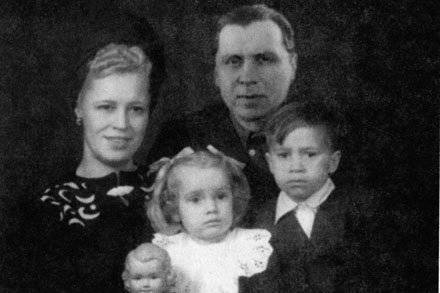 Naum Eitingen and Muza Malinovskaya with children. 1950
Naum Eitingen and Muza Malinovskaya with children. 1950The major state security engineer Timashkov received an order in 1942 for designing a bomb (according to another version, upgrading the English model) for a Gauleiter of Belarus, Wilhelm Cuba. After the end of World War II, Timashkov was sent to Greece as an instructor of Greek partisans who fought with the British.
Eitingon married (civil marriage) to the Museum Malinovskaya, who bore him a son and a daughter. However, soon in Moscow “all kinds of crapings took place”, as a result of which both Eitingon and Sudoplatov turned out to be traitors to the Motherland and received long periods. The unforgettable Nikita Sergeevich was very fond of keeping people in the Vladimir Tsentral who were well-informed in matters that the Soviet people were not supposed to know.
Information